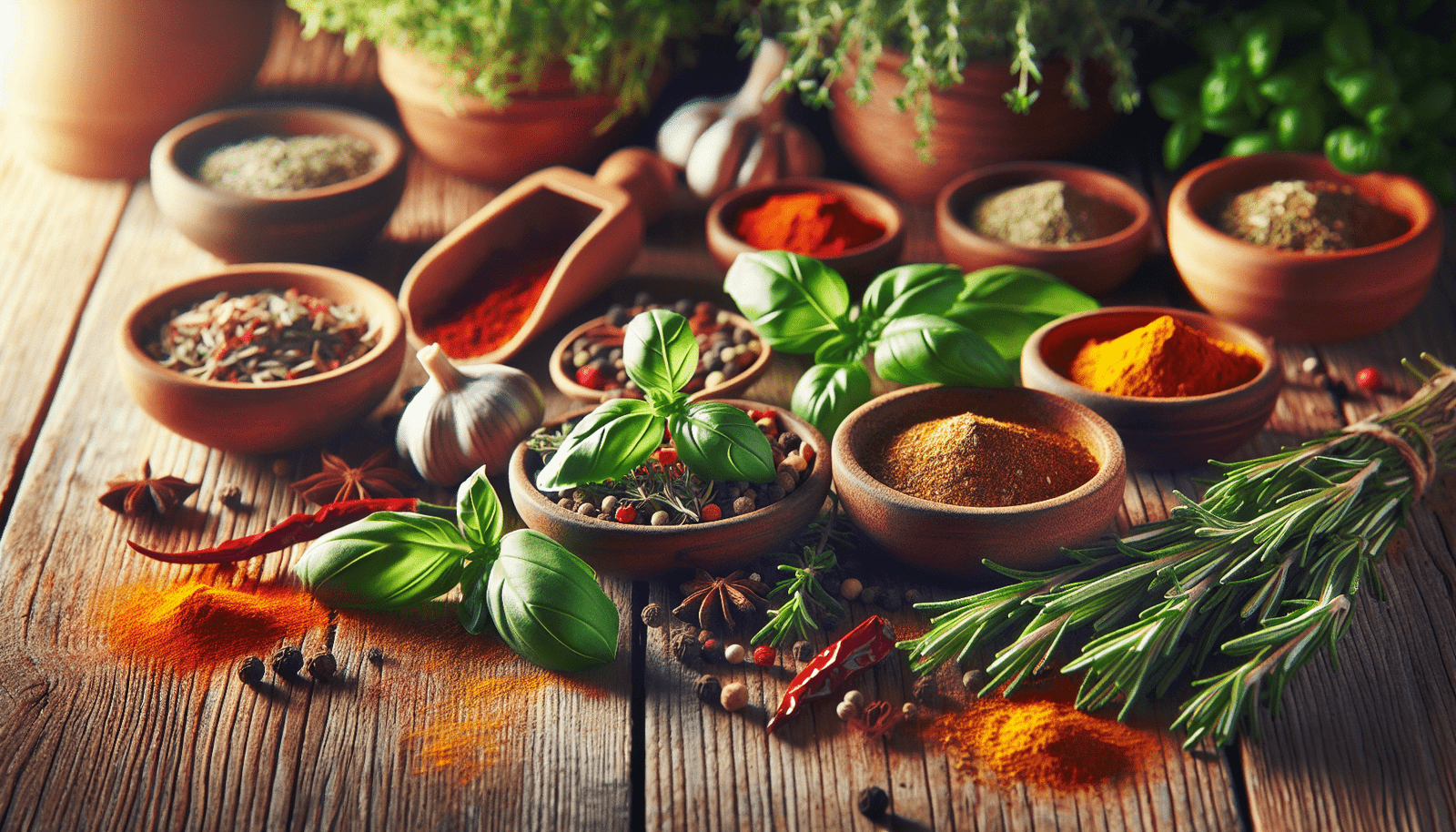Can you use spices and herbs on the Mediterranean diet?
If you’ve ever had a meal bursting with flavor and freshness, chances are it incorporated spices and herbs typical of the Mediterranean diet. This culinary tradition is not just about wholesome ingredients like fruits, vegetables, fish, and whole grains; it also celebrates the bold and vibrant flavors added by spices and herbs. Let’s take a closer look at the integral role these aromatic components play in the Mediterranean diet.
Why Spices and Herbs Matter in the Mediterranean Diet
Spices and herbs are not merely a means to enhance flavor; they also contribute to the overall health benefits of the Mediterranean diet. Packed with antioxidants, vitamins, and minerals, these culinary items help to fight inflammation and boost your immune system.
The Health Benefits of Herbs and Spices
When you think about diet and health, you typically consider macronutrients and calories. However, the inclusion of spices and herbs can elevate the healthfulness of your meals significantly. Here are some key benefits:
- Antioxidant Properties: Many herbs and spices, such as oregano and basil, are high in antioxidants, which combat oxidative stress in your body.
- Anti-Inflammatory Effects: Spices like turmeric and ginger possess anti-inflammatory properties that can boost overall health and well-being.
- Digestive Aid: Certain herbs like mint and fennel can support digestion, making your meals more enjoyable and easier to process.
Common Spices and Herbs Used in the Mediterranean Diet
To make each dish more delectable and healthy, here are some popular spices and herbs commonly used in the Mediterranean region:
Oregano
Oregano is a staple in many Mediterranean dishes, especially in Italian and Greek cuisines. Adding this herb can enhance the flavor of pizza, pasta, and grilled meats.
- Use: Fresh or dried in marinades, sauces, and salads.
- Health Benefit: Contains compounds that may have antibacterial properties.
Basil
Basil is often used in sauces, salads, and as a garnish. Whether it’s fresh or dried, it adds a sweet and fragrant flavor to your dishes.
- Use: Fresh in Caprese salad or dried in pasta sauces.
- Health Benefit: Rich in vitamins A, K, and C.
Rosemary
This aromatic herb complements roasted meats and vegetables perfectly. With its needle-like leaves and strong flavor, a little goes a long way.
- Use: Fresh on roasted potatoes or as a flavoring for lamb.
- Health Benefit: May improve digestion and boost memory.
Thyme
Thyme is versatile and can be used in many dishes. It pairs well with soups, stews, and grilled vegetables.
- Use: Fresh in marinades or dried in casseroles.
- Health Benefit: Known for its antifungal and antibacterial properties.
Cumin
This spice brings a warm, earthy flavor and is often found in Mediterranean, Middle Eastern, and Indian dishes.
- Use: Ground in dips, stews, and rice dishes.
- Health Benefit: May improve digestion and enhance immune function.
Paprika
Made from ground peppers, paprika can range from sweet to smoky. It thrives in various Mediterranean cuisines, especially in Spanish dishes.
- Use: A sprinkle in rice recipes or as a garnish for stews.
- Health Benefit: Rich in antioxidants, especially carotenoids.
Chili Pepper
For those who appreciate a kick in their meals, adding chili peppers or flakes allows you to bring heat along with flavor.
- Use: Fresh in salads or dried in marinades.
- Health Benefit: Contains capsaicin, which may boost metabolism.

How to Incorporate Spices and Herbs into Your Meals
Now that you have a solid grasp of some popular spices and herbs, let’s discuss how you can seamlessly incorporate them into your meals.
Start From the Base
Adding herbs and spices to the base of your dishes can infuse flavor from the outset. For example, when sauteing vegetables, try adding minced garlic, oregano, or thyme early on.
Use in Dressings and Marinades
Homemade dressings and marinades can be a great canvas for spices and herbs. Combine olive oil, vinegar, and your choice of herbs for a refreshing salad dressing, or mix garlic, cumin, and lemon juice for a marinade perfect for chicken or fish.
Enhance the Flavor of Your Grains
Don’t forget about grains! Add spices like paprika or turmeric directly to your rice or quinoa cooking water for an extra layer of flavor.
Experiment with Infusions
Herb-infused oils are simple to make and can be a flavorful addition to various dishes. Just heat olive oil gently with your choice of herbs—rosemary and garlic work wonderfully—and use it for drizzling over vegetables or salads.
Garnish Wisely
A final sprinkle of fresh herbs, like parsley or cilantro, can elevate the presentation and aroma of your dishes. Always add these fresh garnishes at the last minute to preserve their vibrant flavors and nutrients.
Building Blocks of Mediterranean Cooking
To fully appreciate the role of spices and herbs in Mediterranean cuisine, it’s essential to understand the building blocks that define this diet.
Olive Oil
Olive oil is the cornerstone of Mediterranean cooking. Rich in monounsaturated fats and antioxidants, it’s used for cooking, drizzling, and dressing. Many herbs and spices can complement or infuse olive oil, enhancing its profile.
Fresh Fruits and Vegetables
The Mediterranean diet revolves around fresh produce. Combine your fruits and veggies with various herbs and spices to create eye-catching salads and side dishes.
Fish and Lean Proteins
Fish and lean meats are an integral part of this diet, often seasoned with herbs and spices. Think grilled fish seasoned with spices like cumin and served alongside a fresh salad with a drizzle of lemon and oregano.

Flavor Combinations to Try
Sometimes, combining spices and herbs can lead to remarkable new flavors. Here’s a quick guide to some flavor pairings to consider:
| Spice/Herb | Pairs Well With |
|---|---|
| Oregano | Thyme, basil, garlic |
| Basil | Pine nuts, garlic, lemon |
| Rosemary | Garlic, thyme, parsley |
| Cumin | Coriander, chili powder, cinnamon |
| Paprika | Cumin, garlic, onion |
Recipe Ideas
To inspire your culinary adventures, let’s look at a few simple recipes that highlight the role of herbs and spices.
Mediterranean Quinoa Salad
Ingredients
- 1 cup quinoa, rinsed
- 2 cups vegetable broth
- 1 cup cherry tomatoes, halved
- 1 cucumber, diced
- 1 bell pepper, diced
- 1/4 cup red onion, finely chopped
- 1/4 cup fresh parsley, chopped
- 1/4 cup olive oil
- 2 tablespoons lemon juice
- 1 teaspoon dried oregano
- Salt and pepper to taste
Instructions
- In a pot, combine quinoa and vegetable broth. Bring to a boil, then reduce heat and simmer for about 15 minutes, or until the quinoa is fluffy.
- In a large bowl, combine the tomatoes, cucumber, bell pepper, red onion, and parsley.
- In a small bowl, whisk together the olive oil, lemon juice, oregano, salt, and pepper.
- Once the quinoa is ready, let it cool slightly, then add to the vegetable mixture.
- Pour the dressing over the salad and toss to combine. Enjoy chilled or at room temperature!
Grilled Lemon Herb Chicken
Ingredients
- 4 boneless, skinless chicken breasts
- 1/4 cup olive oil
- 2 tablespoons fresh lemon juice
- 2 cloves garlic, minced
- 2 teaspoons dried oregano
- Salt and pepper to taste
Instructions
- In a bowl, whisk together the olive oil, lemon juice, garlic, oregano, salt, and pepper.
- Place the chicken in a resealable plastic bag and pour the marinade over it. Seal the bag and refrigerate for at least 30 minutes.
- Preheat the grill to medium-high heat. Grill the chicken for about 6-7 minutes on each side, or until fully cooked.
- Serve with a side of grilled vegetables or a fresh salad.
Tips for Cooking with Herbs and Spices
Cooking with spices and herbs can be incredibly rewarding. Here are some tips to maximize their flavors in your Mediterranean-inspired dishes:
Fresh vs. Dried
Whenever possible, use fresh herbs over dried as they usually provide a more vibrant flavor. However, dried herbs can be a great substitute. Generally, you’ll need about three times as much fresh herb if using dried.
Timing is Key
When cooking, consider when to add your herbs and spices. Fresh herbs are best added towards the end of cooking to retain their flavors, while dried herbs can be added at the beginning.
Invest in Quality
Quality matters, especially with spices and herbs. Opt for whole spices and grind them yourself—this can elevate the flavor profile of any dish immensely.
Experiment with Ratio
Don’t be afraid to adjust the amounts of herbs and spices according to your taste preference. Start with smaller amounts, taste, and build up as you go.

The Cultural Significance of Spices and Herbs
Throughout Mediterranean history, spices and herbs have been an essential aspect of cultural traditions. They not only represent culinary practices but also reflect the history, trade, and lifestyle of various regions.
A Journey Through Time
Historically, spices were a symbol of wealth and power. They played significant roles in trade and exploration, with many seeking out routes to the East in pursuit of spices and herbs. Today, they remain a crucial element of culinary practices, interweaving cultural stories through the flavors they offer.
Creating Memories
When you prepare meals using traditional Mediterranean spices and herbs, you’re continuing a legacy that connects you to generations before you. It’s a warm reminder that food is not just about nourishment; it’s also about shared experiences and memories.
Final Thoughts
The Mediterranean diet is a delightful blend of flavors, colors, and health benefits, and spices and herbs are at the heart of it. By incorporating these ingredients into your daily meals, you can enjoy enhanced taste while reaping numerous health benefits.
So, the next time you whip up a Mediterranean dish, don’t just add the usual suspects—think about the vibrant spices and herbs you can use to transform your meal into something truly special. Your taste buds, and your body, will thank you!



